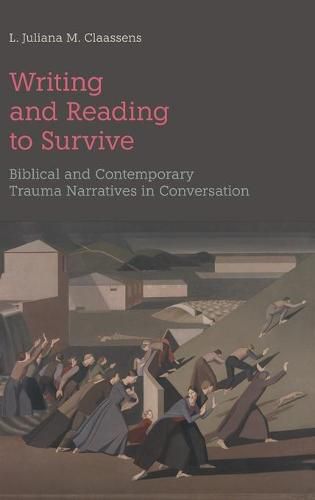Readings Newsletter
Become a Readings Member to make your shopping experience even easier.
Sign in or sign up for free!
You’re not far away from qualifying for FREE standard shipping within Australia
You’ve qualified for FREE standard shipping within Australia
The cart is loading…






This title is printed to order. This book may have been self-published. If so, we cannot guarantee the quality of the content. In the main most books will have gone through the editing process however some may not. We therefore suggest that you be aware of this before ordering this book. If in doubt check either the author or publisher’s details as we are unable to accept any returns unless they are faulty. Please contact us if you have any questions.
Writing and Reading to Survive brings a number of trauma narratives from the Hebrew Bible into conversation with contemporary trauma narratives, exploring how these ancient and modern-day stories mitigate the experiences of pain and suffering in the face of trauma.
Focusing on the intersection between trauma and gender, the trauma narratives here include biblical narratives emerging from the cataclysmic events that all but destroyed the people of Judah at the time of the sixth-century bce invasion and exile. They also include examples of ‘hidden’ or ‘common’ or ‘more mundane quiet’ traumas that are reflective of women’s experience. In both biblical as well as contemporary trauma narratives, one sees evidence of insidious trauma associated with the systemic violence of a deeply patriarchal society; the secret trauma of reproductive loss that connects with many women’s lives both then and now; the ever-present reality of gender-based violence.
To read contemporary trauma narratives alongside biblical trauma narratives can have the effect of expanding readers’ vision, perhaps introducing them to texts that yield fresh insights into often painful topics associated with women’s experience of trauma. Continuing the conversation on the importance of trauma hermeneutics for reading biblical literature, the trauma narratives represented in this monograph serve as a safe haven for those, in past and present contexts, who are reeling from the effects of severe trauma, to voice the unspeakable, and to move towards healing and recovery by writing and reading to survive.
Writing and Reading to Survive is the first volume in a new series from Sheffield Phoenix Press, the Trauma Bible.
$9.00 standard shipping within Australia
FREE standard shipping within Australia for orders over $100.00
Express & International shipping calculated at checkout
This title is printed to order. This book may have been self-published. If so, we cannot guarantee the quality of the content. In the main most books will have gone through the editing process however some may not. We therefore suggest that you be aware of this before ordering this book. If in doubt check either the author or publisher’s details as we are unable to accept any returns unless they are faulty. Please contact us if you have any questions.
Writing and Reading to Survive brings a number of trauma narratives from the Hebrew Bible into conversation with contemporary trauma narratives, exploring how these ancient and modern-day stories mitigate the experiences of pain and suffering in the face of trauma.
Focusing on the intersection between trauma and gender, the trauma narratives here include biblical narratives emerging from the cataclysmic events that all but destroyed the people of Judah at the time of the sixth-century bce invasion and exile. They also include examples of ‘hidden’ or ‘common’ or ‘more mundane quiet’ traumas that are reflective of women’s experience. In both biblical as well as contemporary trauma narratives, one sees evidence of insidious trauma associated with the systemic violence of a deeply patriarchal society; the secret trauma of reproductive loss that connects with many women’s lives both then and now; the ever-present reality of gender-based violence.
To read contemporary trauma narratives alongside biblical trauma narratives can have the effect of expanding readers’ vision, perhaps introducing them to texts that yield fresh insights into often painful topics associated with women’s experience of trauma. Continuing the conversation on the importance of trauma hermeneutics for reading biblical literature, the trauma narratives represented in this monograph serve as a safe haven for those, in past and present contexts, who are reeling from the effects of severe trauma, to voice the unspeakable, and to move towards healing and recovery by writing and reading to survive.
Writing and Reading to Survive is the first volume in a new series from Sheffield Phoenix Press, the Trauma Bible.